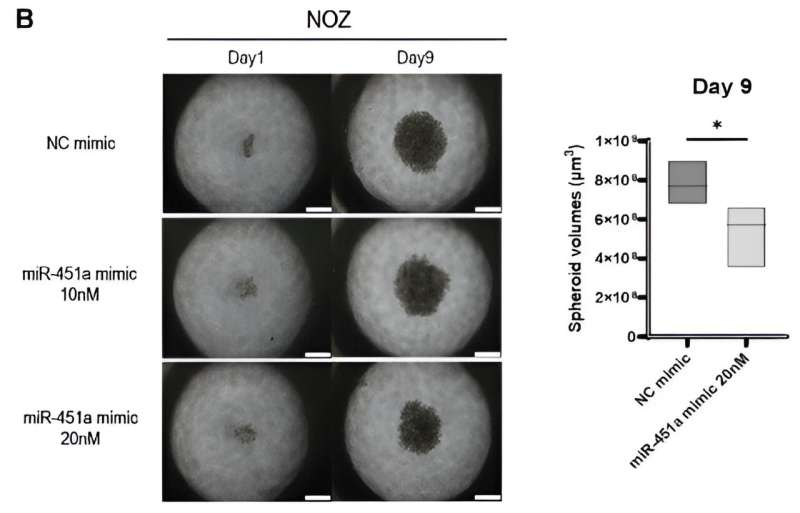This article has been reviewed according to Science X's editorial process and policies. Editors have highlighted the following attributes while ensuring the content's credibility:
fact-checked
trusted source
proofread
A novel targeted molecular therapy for drug-resistant biliary tract cancer

Biliary tract cancers (BTCs) including cholangiocarcinoma (CCA) and gallbladder cancer (GBC) are becoming more prevalent globally. An effective chemotherapeutic agent for the treatment of BTCs is gemcitabine. Other novel molecular-targeted drugs have also been developed; however, they are only effective at treating a few cases of BTCs.
In addition, very few drugs are effective against GEM-resistant BTCs. While surgery is the best option for the treatment of BTCs, many patients are diagnosed late due to a lack of symptoms. Another challenge for physicians treating BTCs is identifying an appropriate treatment approach due to the complexity of the hepatobiliary-pancreatic system. Therefore, developing novel treatment strategies for BTCs, especially for GEM-resistant BTCs, is the need of the hour.
Nucleic acid-based therapies built around microRNAs (miRNAs) are the next frontier of cancer treatment. miRNAs play a role in gene expression, and their dysregulation is believed to contribute to cancer pathogenesis. Now, researchers from Japan are exploring the prospects of microRNA-451a (miR-451a), a miRNA identified in gallbladder tissue, as a viable targeted nucleic acid BTC therapy.
The team, led by Assistant Professor Koichiro Tsutsumi, along with Dr. Taisuke Obata and Dr. Motoyuki Otsuka, all from the Department of Gastroenterology Okayama University Hospital, Japan, recently uncovered the mechanism of miR-451a's antineoplastic effects. Their findings were published in Molecular Therapy—Nucleic Acids.
"Apart from gemcitabine, very few effective drugs are available for the treatment of BTCs. Therefore, there is an urgent need for new therapies. Additionally, we don't know a lot about the miRNA targets that can be used to improve the prognosis of BTCs, especially in the context of resistance to GEM," explains Dr. Tsutsumi while discussing his motivation behind this research.
The team had evidence from previous experiments that miR-451a was downregulated in patients with GBC, and they decided to build on other research that showed that the miRNA inhibited cell proliferation when introduced into human GBC cells. They transfected miR-451a into GBC, gemcitabine-resistant GBC (GR-GBC), and gemcitabine-resistant CCA (GR-CCA) cells to understand its effects on tumor progression.
They also studied the gene expression profile in these three groups following transfection to gauge how cell-signaling pathways were altered by miR-451a.
"Under experimental conditions that mimicked those of the cancer environment, we found that miR-451a significantly diminished cell proliferation, induced cell death, and reduced the occurrence of chemoresistant cell types in GBC, GR-CCA, and GR-GBC cells," says Dr. Tsutsumi.
He adds, "One of the factors known to promote metastasis and chemoresistance was the phosphatidylinositol 3-kinase (PI3K)/AKT pathway. This pathway was suppressed partially through the downregulation of macrophage migration inhibitory factor (MIF) after the transfection of miR-451a. These findings underpin miR-451a's use as a replacement therapy for GEM-resistant BTCs."
miR-451a's effects at the molecular level were reflected in 2D or 3D cell culture experiments where GR-CCA and GR-GBC cells were rendered less viable following treatment.
Dr. Tsutsumi is looking to the future, and the group is planning future studies to evaluate the effective delivery of miR-451a and validate its clinical application. He concludes, "Nucleic acid-based treatments are not mature enough to be considered first-line treatments for BTCs, so chemotherapy and immunotherapy still have their place. However, given miR-451a's antineoplastic activity against GEM-resistant BTCs, I anticipate them to be mainstream alternatives with further developments."
More information: Taisuke Obata et al, MicroRNA-451a inhibits gemcitabine-refractory biliary tract cancer progression by suppressing the MIF-mediated PI3K/AKT pathway, Molecular Therapy—Nucleic Acids (2023). DOI: 10.1016/j.omtn.2023.102054





















